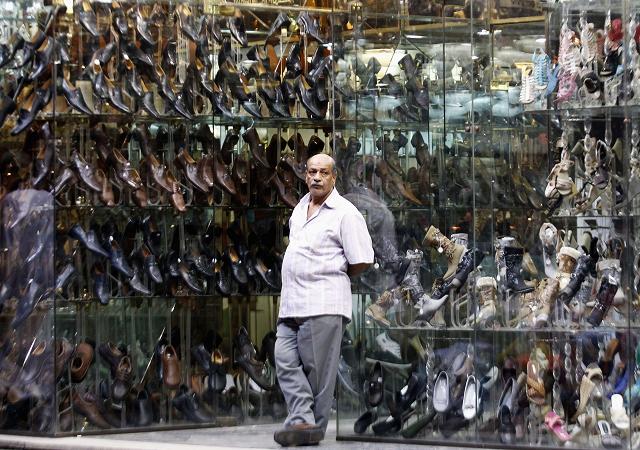Latest NEWS
- Aswat Masriya, the last word
- Roundup of Egypt's press headlines on March 15, 2017
- Roundup of Egypt's press headlines on March 14, 2017
- Former Egyptian President Hosni Mubarak to be released: lawyer
- Roundup of Egypt's press headlines on March 13, 2017
- Egypt's capital set to grow by half a million in 2017
- Egypt's wheat reserves to double with start of harvest -supply min
- Roundup of Egypt's press headlines on March 12, 2017
Egypt Investment Minister aims for 7 pct growth in two years

A man stands outside a footwear shop in Cairo October 22, 2012. REUTERS/Mohamed Abd El Ghany
By Patrick Werr
CAIRO, (Reuters) - Egyptian Investment Minister Yehya Hamed said on Monday he aimed to boost Egypt's anaemic economic growth to as high as 7 percent in two years by improving the environment for private investors.
He said he would work out reconciliation agreements with business people who had fled abroad or were suffering legal problems since the 2011 uprising that ousted Hosni Mubarak.
Egypt's economy was growing at about 7 percent annually for several years before the uprising. But even that pace was barely enough to produce work for the large number of Egyptian youths entering the job market - one of the drivers of the protests.
Since then, the economy has been battered by political instability, a loss of tourism and foreign investors and regular labour strikes. It grew by 2.2 percent in the fiscal year that ended last June and 2.4 percent in the last six months of 2012.
"Next year we aspire to have 3.7 or 4 percent GDP and the year after we aspire to touch base with 6.5 and 7 percent," Hamed told the American Chamber of Commerce in Egypt.
His numbers seemed ambitious, given that 10 economists polled by Reuters in April expected the economy to grow by 2.0 percent in the fiscal year to June 30, 2013, and 3.0 percent in the year ending June 2014, revising down their forecasts from the previous September.
President Mohamed Mursi's Muslim Brotherhood has come under fire for not moving decisively to revive an economy kept afloat by loans from Qatar and other states in the region. It is also in talks to obtain an IMF loan in exchange for economic reforms.
Businessmen complain that government officials have been afraid to take decisions in Egypt's fraught political climate. Foreign investors are also concerned that the currency is overvalued and will soon have to be devalued sharply.
Popular anger is still simmering too. Millions have signed a national petition demanding the president resign and plan to take to the streets on June 30, when Mursi marks a year in office.
"BAD SIGNALS"
Hamed, a member of the Brotherhood, was appointed to the cabinet in a reshuffle last month. At 34, he is one the youngest ministers in the country's modern history.
He listed plans for road building, the distribution of land for agricultural and industrial projects and other schemes where private investors would play a leading role.
"If the deals start in the next fiscal year, which will start in a few days from now, we can get the 4 percent, if we have a very good strategy," Hamed said, in English.
He hoped to rapidly increase investment by government and private and foreign investors from the current $40 billion.
"In order to reach a sustainable 7 percent GDP growth rate over seven years, we need to increase from $40 billion to $60 billion, and we can't have the $60 billion except by the private sector," he said.
The minister the cabinet had approved changes to the investment law that would give him greater scope to negotiate reconciliation agreements with businessmen in exile since the uprising to try to the jumpstart investment climate.
He said the banning from Egypt since the uprising of figures such as Rachid Mohamed Rachid and Mohamed Mansour, who as ministers were major forces behind Mubarak-era economic liberalisation policies, was "giving very bad signals".
Rachid, minister of trade and industry from June 2004 until January 2011, fled to Abu Dhabi during the uprising, and Mansour, minister of transport from 2006 until 2009, remained in London where he was receiving medical treatment at the time.
An Egyptian court convicted Rachid in absentia and sentenced him to five years in prison in June 2011 for profiteering and squandering public funds. Hamed did not say how he planned to work with the pair, or whether he intended to invite them home.
"We have to give very positive signals for people to start coming and investing in Egypt, and we can't do that unless we give positive signals to the locals, and then invite foreigners to come and invest in Egypt," he said. (Editing by Alison Williams)










